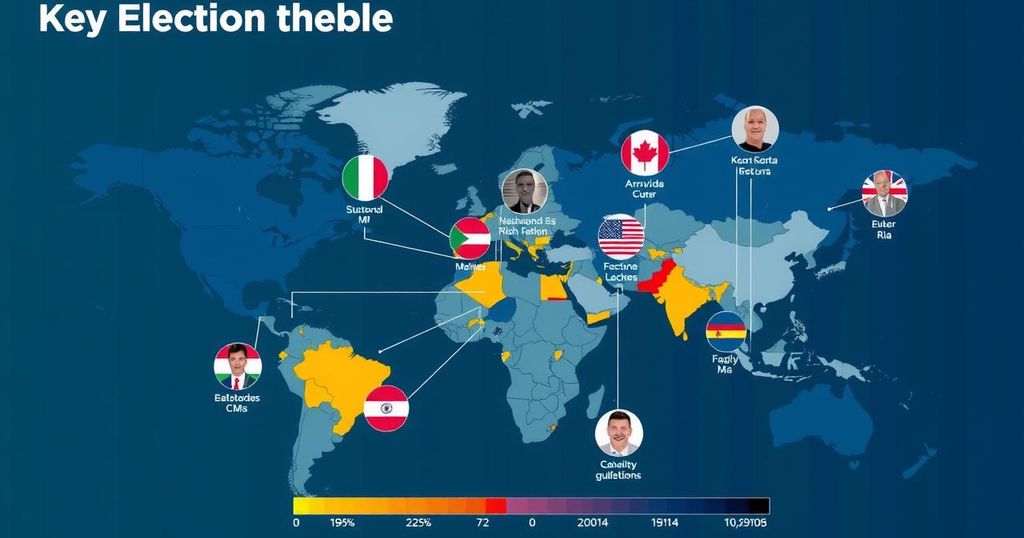Global Hot List: Key Consequential Elections of 2024
The 2024 election cycle has featured critical votes worldwide, highlighted by Donald Trump’s return to the U.S. presidency, Narendra Modi’s waning majority in India, Claudia Sheinbaum’s election in Mexico, and historical shifts in South Africa and Pakistan. These elections reflect broader trends of political upheaval and changing voter sentiments across various nations while the implications for the European Union loom with Romania’s imminent presidential election.
The year 2024 has witnessed a significant series of elections that have shaped the political landscape globally. Notably, Donald Trump’s return to the U.S. presidency has stirred discussions on the implications for both domestic and global politics, as many observers, including Francis Fukuyama, have noted a potential setback for liberalism. In India, Prime Minister Narendra Modi faced unexpected challenges, as his party’s majority waned, hinting at a changing political atmosphere in the country. Meanwhile, Mexico celebrated a historical milestone with the election of Claudia Sheinbaum as the first female president, managing to outperform her predecessor despite trends of incumbent losses worldwide. In South Africa, the African National Congress was compelled into coalition politics following a significant electoral defeat, leading to unprecedented governance arrangements. The Liberal Democratic Party in Japan also experienced a noteworthy loss in their majority, though political continuity was favored by voters. In Pakistan, the political turmoil surrounding former Prime Minister Imran Khan underscores the contentious nature of governance, as his party claims manipulation in the electoral process despite his imprisonment. The UK Labour Party, despite a large victory, has seen a decline in support, signaling potential challenges ahead. In France, a snap election aimed at consolidating power led to an unexpected partnership with far-right entities amidst rising discontent. Finally, Senegal’s recent election reflects a growing interest in decolonial policies, resonating with similar movements across Africa. Additionally, the prospect of Romania’s presidential election poses significant implications for the European Union as it features a contest between reformist and far-right candidates.
The year 2024 has been a pivotal year witnessing critical elections across several nations, affecting the political dynamics within them and their international relations. Such elections are often reflections of shifting public sentiments, challenges to incumbent powers, and rising opposition forces, prompting analyses about their broader implications on democracy and governance. Understanding the context of each election illuminates the underlying trends shaping the political arena in various regions, from South Asia to Europe, contributing to a more comprehensive global narrative.
In conclusion, the elections of 2024 have underscored significant transformations in various political landscapes around the world. With key results ranging from Trump’s controversial return in the U.S. to the unexpected shifts in India, South Africa, and other nations, these electoral outcomes point to a complex interplay of democratic processes, rising populism, and calls for new governance frameworks. Observers will be keenly assessing how these developments impact future political trajectories, both domestically and internationally.
Original Source: www.semafor.com




Post Comment